- Home
- Jim Thompson
Bad Boy
Bad Boy Read online
Bad Boy
Jim Thompson
Little, Brown and Company
New York Boston London
Begin Reading
About the Author
Preview of Heed the Thunder
Copyright
1
My earliest recollections are of being pinched. Not in the figurative sense, but actually. I was an awkward, large-headed tot, much prone to stuttering and stumbling over my own feet. My sister Maxine, though somewhat my junior, was quick-moving, quick-thinking, glib and extremely agile. When my actions and appearance irritated her—and they seemed to almost constantly—she pinched me. When I failed to respond quickly enough to her commands, she pinched me. The metaphor, “as smooth as a baby’s skin,” has always been meaningless to me. My infant hide appeared to have been stippled with a set of coal tongs.
One day, shortly after the Thompson family fortunes had undergone an unusually terrifying nosedive and we had moved into a particularly execrable section of Oklahoma City, Maxine spotted two Negro children returning home from the grocery. They had a large bottle of milk with them. Bringing me up from the steps with a quick pinch, Maxine dragged me out to the sidewalk and accosted the two youngsters.
Would they like to be white? she inquired. Well, in return for their milk, she would perform the transfiguration. She had done the trick for me, and I had been blacker than they were. Much, much blacker…and now just look at me.
The tots were a little dubious, but, being pinched, I loudly swore to Maxine’s tale. And, being pinched again, I hurried into the kitchen and got the implements—a bar of soap and a scrubbing brush—with which the transformation was to be effected. At Maxine’s instigation, I took the patients out to the back-yard water hydrant, and began scrubbing them. Maxine took their milk into the privy (it was that kind of neighborhood), drank all she could hold, then dropped the bottle down the hole.
Emerging, she entered the house, beginning to scream with horror as soon as she had got through the door. Mom came running out, Maxine in the vanguard. Pretending to pull me away from the puzzled Negroes, she got in several energetic pinches, making me howlingly incoherent by the time Mom reached the scene. She gave the tots the price of a fresh quart of milk, wiped them off and dragged me into the house, declaring that she didn’t know what she was going to do with me. Snickering hideously, Maxine remained in the yard, free to go about her devilish designs.
Being very young, I was unable to explain the affair within the time that it would have done any good to explain. I got an impression from it, however, very nebulous, then, but one that expanded and jelled later.
I was going to catch hell no matter what I did. I might as well try to enjoy myself.
2
I was always a sucker for friendship. Anyone who spoke a friendly word to me could have the Buster Brown blouse which I customarily wore. In my earlier years, my father traveled considerably about Oklahoma, seldom staying in any town more than a month—not long enough for me to become accustomed to a strange school, yet too long for me to lay out. Just about the time I began to get acquainted, we would pull up stakes.
So I hungered for friendliness, and no matter how many times I was duped I never ceased to bite on the bait that was put in front of me. There was a game called “pushover” in those days. A boy would come up to you, put his arm around your shoulder and engage you in kindly conversation. Then, just when you were beginning to warm up to him, another boy would kneel behind you, the first would give you a push, and you would fall backwards on your head.
I don’t know how many times I fell for this game, and similar ones, before I began to get the idea that what appeared to be friendship might be something else entirely. I never liked the idea, and I fought against it. In later life, more or less as a duty, I would draw back from a proffered kindliness and coldly demand the reason for it.
In time, my father settled more or less permanently in Oklahoma City where he became the law partner of Logan Billingsley, brother of Sherman, the Stork Club proprietor. In the early days of Oklahoma, Pop had been a peace officer, and had saved Logan from being lynched. I know nothing about the merits of the case, but I do know that they became close friends and later partners.
Logan had a son named Glenn, a more mischievous brat than which never lived. I understand that he is now running a swank restaurant in Hollywood, but that has nothing to do with this story.
Glenn led a charmed life. One Saturday afternoon when he was leaning out the office window, he fell out. But he survived the four-story fall with no more than a scratch. He landed on the awning of the street-level drug store, went on through it, and dropped into a baby carriage. The vehicle was empty of its occupant, fortunately, for he made a wreck of it. But, as I say, he wasn’t hurt a bit.
We lived over in the west end of town, in the vicinity of the Willard school, and a very tough section it was in those days. I came home nightly with large chunks missing from my person and attire. Glenn came in always whole and happy, and usually bearing a quantity of valuables which had had other owners that morning.
One morning a bunch of older boys dropped him down a manhole and sealed the lid back on. Most lads in such a situation would have perished of fright, but not Glenn. He wandered around through the various arteries of the sewer, picking up a sizeable quantity of small change from the silt along his way. After a few profitable hours of this, he made his way out through another manhole. He then phoned the police, quoting that a friend of his had been thrown into a sewer by a certain group of boys—he gave their names. Then, without giving his own name, he hung up and went into town.
The cops collared the youths at school and readily wrung a confession from them. The victim was identified as Glenn. A search of the sewer was begun for his body and the young criminals were taken to the police station, facing a long stretch in the reformatory.
Late in the afternoon, Glenn put in his appearance and was hailed by the admiring and relieved police as a hero. They brought him home where he was tucked into bed, apparently too shocked by his experience to eat. Actually, there was nothing wrong with him but a stomach-ache and, perhaps, eye strain. He had visited four picture shows and eaten several dollars’ worth of candy, ice cream and other delicacies.
After that experience the worst toughs at school shied away from Glenn. He was pure poison.
I always admired him.
3
Logan moved on to New York and greener pastures, and Pop became associated with another attorney, Tom Connors. Tom had been quite a famous man, and he still was a topnotch lawyer when he was sober. He was a good shot and never without a pair of ivory-handled forty-fives given him by the bandit, Pancho Villa.
With two children and another on the way, Pop was becoming a little worried about the future. So, as a backlog against the uncertainties of the law business, he bought a small neighborhood grocery store in the east side of Oklahoma City. He was out of town much of the time, so it was up to Mom and us kids to look after the store.
There was a large garden in the back yard, and also a pear orchard. Our living quarters were in the rear of the store. With free rent and free vegetables and fruit and a small steady business, it looked like we had the financial problem licked.
In this, we figured without Tom Connors.
He came out from the office one summer afternoon when Pop was away, drinking but not in bad shape. We gave him the spare bedroom and left him alone. After a brief nap he went out the back door and came back with a couple of quarts of booze. Then he began to prowl around the back yard.
We had finished eating by the time he returned, and he had finished the bottle, and there was an expression of deepest consternation upon his face.
“My dear Mrs. Thompson,” he said, in his best courtroo
m manner, “what means have you taken to protect that very valuable pear harvest? Do you have a night watchman or a watch dog?”
“No.” Mom smiled hesitantly.
Tom shook his head grimly.
He was, he said, my father’s friend. As such, he did not propose to see him stripped of his chattels without a protest. He would take care of the pear orchard himself. When Pop returned there would not be so much as a single pear missing.
Procuring a ball of wrapping twine from the store, he went into the back yard and climbed up a tree. He laced the twine back and forth through the twigs and branches, forming a sort of giant cobweb among them before he fell to the ground on his back. Nothing daunted, he climbed into another tree and treated it as he had the first. And so on to the next, and the next.
There were twenty trees in the orchard. I think Tom must have strung well over a mile of string through them. Then, with the cooperation of Maxine and me, he filled a number of tin cans with pebbles, placed a few cans in each room of the house, and tied the end of a string to each of them.
Well, there weren’t any pear thieves around that night (although we could never convince Tom of the fact), but there was a high wind. The trees began to sway and dip. The pebble-filled cans started leaping. A barrage of rocks whistled through the rooms, smashing windows, light fixtures and china. Tin cans crawled in and out of the beds. Wrapping cord—miles of it, seemingly—sought grimly to truss us up.
Struck and snagged in some very tender spots, I started squawling for Mom. Maxine miraculously found me in the dark and pinched me. Mom tried to smack both of us and almost broke her wrist on the bed rail. Then, Tom waked up.
He leaped to the floor, a forty-five in each hand, and cried out that we were being raided. Shouting wild instructions in Mexican, he sprang for the back door. Immediately his feet were entangled in a score of cords, and his flailing arms were likewise caught and made helpless. He struggled onward manfully, dragging the cans with him, along with debris, bedclothes and lighter bits of furniture. At last, however, he stumbled, struck his head against the door-casing with the sound of a bursting pumpkin, and fell down.
He began to snore peacefully.
Mom lit a candle, and came in and looked at him. Her face was pretty grim. She was swinging a catsup bottle in one hand. Finally, after an obvious struggle between her better nature and her natural impulses, she threw a blanket over him and we all went back to bed.
Tom got up ahead of us in the morning to go after more whiskey, and by the time we arose he was anything but contrite. Fortified with several stiff slugs, he led us out into the back yard and commanded us to look upon the wreckage there. Would we now tell him (he asked) pointing at the fruit-littered ground, that thieves had not been out during the night. He denied that there had been any wind.
With Mom protesting angrily, Tom went around and posted himself at the front door of the store. Fingering his forty-fives, he questioned and harangued and threatened every patron who sought to enter. He called them by fearful “aliases” and recited their “records” to them. Some of them fled, and some, of sterner stuff, merely stamped away in high dudgeon.
Around noon a tall heavy-set man bearing a briefcase turned in at the walk: Pop. He got Tom to go to bed and, later, to a “cure.” A week or so after that we disposed of the store.
In that time, as I remember, we didn’t have a single customer.
4
Pop was practically self-educated, his financial position was more often than not insecure, and he was careless about dress and the social niceties. But few men had as many friends among the great, the would-be and the near. Few men had their advice so sought after.
Pop had a horror of ignorance—I’ll tell you why, shortly—and had made himself an expert on almost everything. Politicians, from presidents to ward heelers, prized his opinion on political matters. Grain speculators consulted him on the crop outlook. Wire services quoted his predictions on the outcome of prize fights and horse races. He knew more about law, accounting, agriculture and a dozen other professions and pursuits than many men who made them their life work.
In the early twenties when we were living in Fort Worth, Texas, Dr. Frederick A. Cook, the Polar explorer, was our dinner guest one night. Doc had entered the oil business a short time before and was riding high. He was renting three floors of a downtown office building, he employed close to a thousand people, and his postage bill alone ran twenty-five hundred dollars a week.
He had brought a batch of advertising literature out for Pop to look at. Pop did.
“Don’t send this out, Doc,” he advised. “It’ll put you in the pen.”
“Aw, now, Jim,” Doc laughed, annoyed. “My copywriters have worked on that for weeks. I’ve got thousands of dollars tied up in printing. What’s wrong with it?”
“It violates the blue-sky laws. Your attorneys can show you where.”
“But my attorneys say it’s all right!”
Pop shrugged and changed the subject. Or tried to. Cook insisted on arguing about the literature. He finally got a little angry about it.
“The trouble with you, Jim,” he declared, “is that you’re afraid every club is going to fly up and hit you. You’re wrong about this deal and I’ll prove it to you. I’m going into the mail with this stuff tomorrow!”
He got a twelve-year stretch in Leavenworth.
Pop was a wizard in large affairs, but in mundane matters he was a flop. You couldn’t convince him of the latter. Periodically, he went on family-management sprees, and he either refused to admit the horriferous results or attributed them to our failure to cooperate.
As an eight-year-old, I can remember his asking Mom about my tastes in literature. He expressed his dissatisfaction with her reply by going out and buying a twelve-volume set of American history and another set of the letters of the presidents. And he pooh-poohed her angry opinion that the stuff was too old for me.
“You’re bringing these children up in ignorance,” he declared. “Now, when I was four years old, I could name all the presidents and…”
There followed a long list of accomplishments, of which I was no more capable than I was of flying. (I suppose the comparison shamed me all my life.) But for months afterward, I was required to read the books aloud to him every night. I read them at home, while at school I read the adventures of Bow-wow and Mew-mew, and Tom and Jane at grandmother’s farm.
In the same fashion, I was drilled in higher accountancy before I had mastered long division; I was coached in political science before I ever saw a civics class; I learned the dimensions of Betelgeuse before I knew my own hat size. I was always a puzzle and a plague to my teachers. I often knew things that they didn’t but seldom anything that I should.
I don’t mean to give the impression that Pop was harsh. He was anything but. He seldom raised his voice. Never once did he so much as paddle one of us kids. It was simply that he couldn’t be content to manage his own sphere and let Mom manage hers.
Every once in a while he would get the notion that we weren’t eating properly, and he would undertake to “put a little meat on our bones.” These undertakings usually manifested themselves as great messes of what he called “succotash”—beans, tomatoes, corn, peas and perhaps a bottle of catsup, all cooked together in the largest kettle he could find. Mom would sternly forbid us to eat any of it, so Pop, after disposing of a quart or two, would take the receptacle under his arm and go around and make gifts of it to the neighbors.
It was Pop’s greatest fault that he could seldom see bad in anyone. He did not want it pointed out to him, and he refused to admit it when it was. After we sold our grocery store, we moved over on West Main Street in Oklahoma City. There was a family across the street whose little girl was always fighting with Maxine (or vice versa) and Mom, after a few words with her mother, decided that they were trash. Pop said that she shouldn’t make statements of that kind. We weren’t really acquainted with the people and shouldn’t form judgments until w
e were.
Pop had served us “succotash” that evening, and Mom was not in the best of humor.
“If you think so much of them,” she suggested, sweetly, “why don’t you call on them? Take them some of that stuff. They look to me like they’d eat anything.”
There were a few more words, and, finally, Pop got up and put on his hat. Taking the kettle under his arm, he marched stiffly out of the house and across the street.
Some thirty minutes later he returned—and with him he brought the detested neighbors: the man and woman and their little girl. The man was a small wiry fellow, with the bluest eyes I have ever seen. The woman was a gaudy, gushy type. At Pop’s instigation, they were paying us a social call.
Mom sat with her lips compressed, emitting monosyllables when she was forced to. Pop, of course, became more and more hospitable.
It developed that the man was the local agent for a St. Louis automobile dealer, and Pop promptly announced that he was interested in buying a car. Before the visit was over he made an appointment for a demonstration.
When our visitors had finally departed Mom began to laugh rather wildly.
“You buy a car! Are you crazy, Jim Thompson? We’ve got another baby coming, and we owe everyone in the country now. And you talk about buying a car! I’ll just bet you that fellow is a criminal! I’ll bet he steals those fine cars he drives around!”
Pop said this was preposterous. “I refuse to discuss the matter further.”
“Well, you won’t catch me riding with you! Me or any of the kids…” And we didn’t go, either.
So Pop went for the ride alone, and several others. The price of the car was surprisingly cheap—so much so that Pop, who was usually agile in such situations, found it difficult to avoid buying, and Mom, who loved a bargain, wavered somewhat. But having stated so often that the man was a criminal, she would not back down.

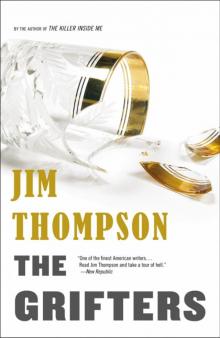 The Grifters
The Grifters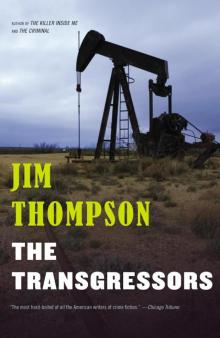 The Transgressors
The Transgressors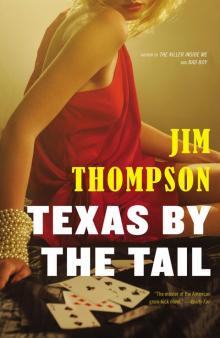 Texas by the Tail
Texas by the Tail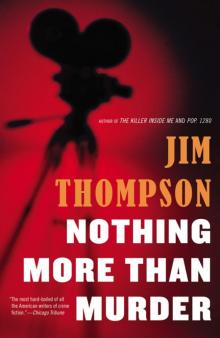 Nothing More Than Murder
Nothing More Than Murder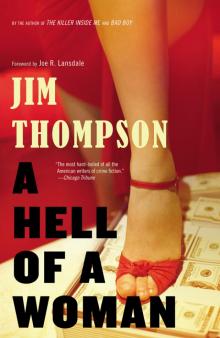 A Hell of a Woman
A Hell of a Woman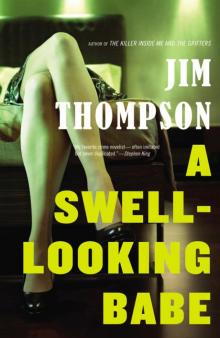 A Swell-Looking Babe
A Swell-Looking Babe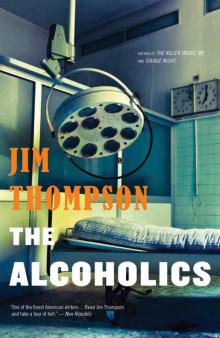 The Alcoholics
The Alcoholics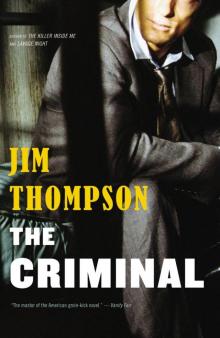 The Criminal
The Criminal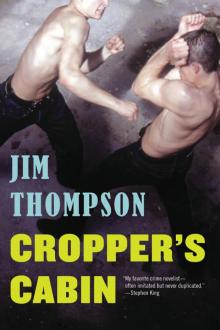 Cropper's Cabin
Cropper's Cabin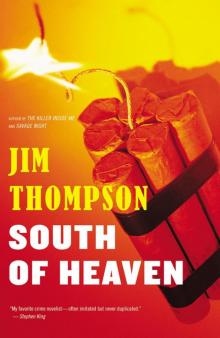 South of Heaven
South of Heaven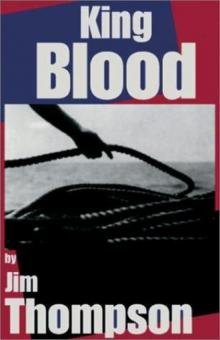 King Blood
King Blood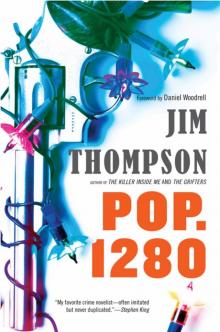 Pop. 1280
Pop. 1280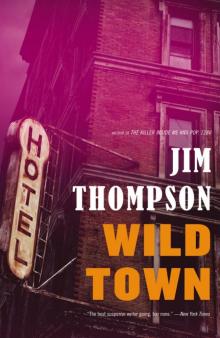 Wild Town
Wild Town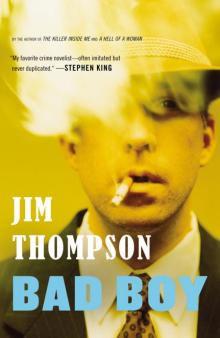 Bad Boy
Bad Boy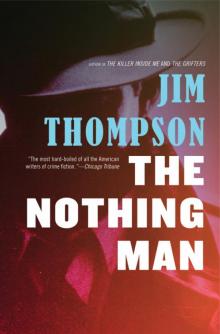 The Nothing Man
The Nothing Man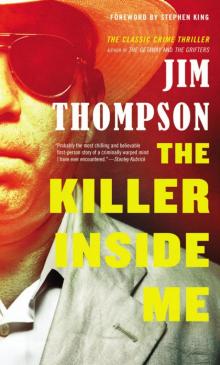 The Killer Inside Me
The Killer Inside Me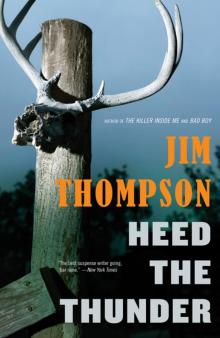 Heed the Thunder
Heed the Thunder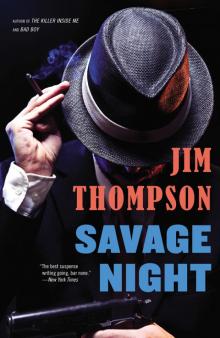 Savage Night
Savage Night Recoil
Recoil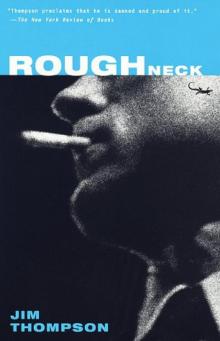 Roughneck
Roughneck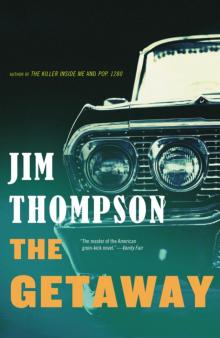 The Getaway
The Getaway